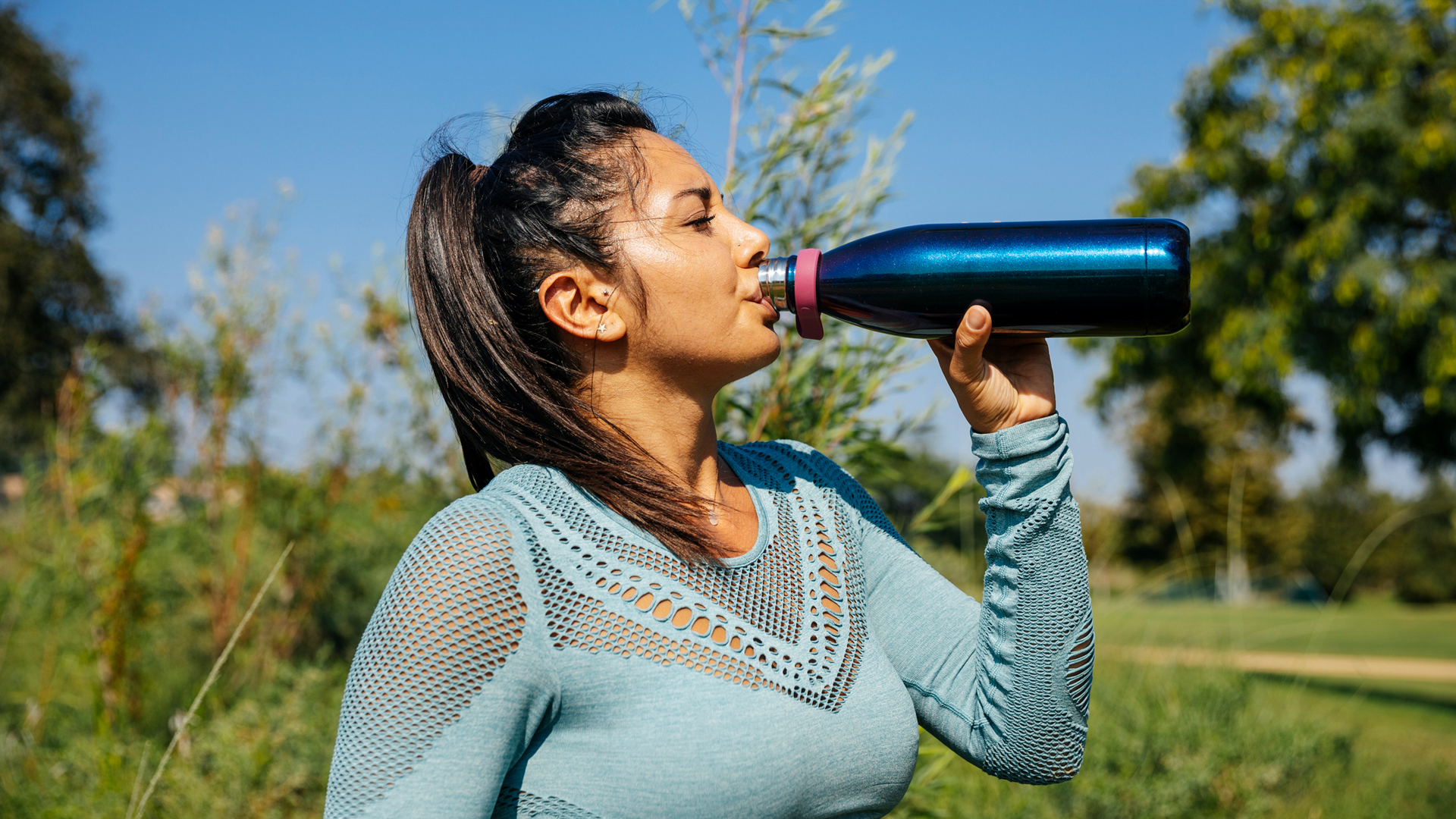Why is water important?
We're often told that we need to drink more water, but exactly why is water important?

If you’ve been pondering the question ‘why is water important?’ rest assured, you’re not alone. While it probably won’t come as a surprise to hear that everyone needs to drink water to survive, most of us invest in one of the best water bottles and commit to guzzling down our daily water intake without really understanding what makes water so vital.
There are quite a few things that make water necessary to the human body, from cellular functions, to aiding digestion, and even improving concentration and exercise performance. You’ve probably even heard the recommendation to drink a certain amount of water every day (usually about 8 glasses or so), but where does that number come from? And what happens if you don’t drink enough?
This article will tackle everything and anything you would need to know about why water is important, including why we need to drink water, what happens when we don’t get enough and the effect water has on our body. Let’s dive in!
Why do we need to drink water?
Knowing how to stay hydrated with water is super important. Why? Well, largely because the human body is about 60% water and because we are continuously losing water through urine, sweat and even just breathing, we need to ensure we’re replacing that fluid so that our cells, tissues and organs can all function optimally.
Water is a solvent, which means that other substances can dissolve in it, which allows for their transportation between cells in the body. Substances like glucose (the body’s preferred fuel source) and amino acids (the building blocks of protein) dissolve very effectively in water, and use water as a carrier for them throughout the body.

Water also carries vitamins and minerals to and from the cells, and is vital in removing waste products from individual cells, as shown by research in the Biochemical Journal. Further, water consumption ensures appropriate blood volume, viscosity, and circulation, which is vital for the proper function of all organs and tissues of the body, according to a paper in Nutrition Reviews.
Water is also vitally important for regulating body temperature. It has a great capacity to store heat, preventing large, rapid drops in internal temperature, and through sweating, water has arguably the most efficient avenue to lose heat when environmental temperature is higher than body temperature, as per an article in Military Medicine.
Finally, water is essential to form many bodily fluids: tears, saliva, sweat, urine, and blood, amongst others. Water is also a highly effective lubricant for joints helping to produce synovial fluid and cartilage, which help keep joints healthy through smooth movements. Water also helps with joint health by maintaining cells’ shapes, acting as a shock absorber during impacting activities like walking or running, which even protects the brain and spinal cord, according to a review article in Nature.
What happens if you don’t drink enough water?
Not drinking enough water can lead to dehydration very quickly, and it’s more common than we think. According to a 2020 paper in StatPearls, between 28% and 75% of adults in the US are dehydrated at any given moment. This is
attributed to a number of factors, notably overconsumption of caffeinated drinks like coffee and soft drinks, which a 2018 study in Nutrients lists as common replacements for water that act as a diuretic that cause the body to lose even more water.
Even ‘mild’ dehydration (a loss of water corresponding to 1-2% of body weight) can lead to significant impairments in cognitive function, concentration, alertness, memory, physical performance, sport-specific skills, and physical endurance, according to research in Nutrition Reviews.
According to a study in the Journal of Applied Physiology, larger losses in water corresponding to 4% of body weight (which research still considers ‘mild’) can lead to poor cardiovascular function as blood plasma volume drops which causes an increase in heart rate and stroke volume (the amount of blood the heart perfuses per beat). Dehydration of this level can also cause decreases in skin blood flow and sweating, which leads to an increase in body temperature, which can complicate any heat-induced dehydration, as per another study from the Journal of Applied Physiology.
What effect does water have on the body?
As you may be able to tell, drinking water will have more or less the opposite effect to not drinking water, for all the reasons outlined earlier in the article. In an ideal world, we would all stay hydrated by drinking water regularly, and so we may never notice the effect that drinking water has because we’d never be dehydrated. However, we know that not to be the case.
Given the host of cognitive problems that dehydration can have on the body, drinking water can often improve your ability to focus, concentrate, and retain information. A lot of people also ask the question ‘does drinking water help you to lose weight?’ and evidence suggests that it absolutely can. Not only that, it aids in digestion, due to its role in nutrient absorption, and creation of digestive fluids and enzymes like hydrochloric acid. Drinking water can also reduce joint pain or wear and tear, due to its role in joint cushioning and maintenance of synovial fluid and cartilage.

Drinking enough water
Clearly, drinking water is utterly vital for a whole host of reasons, and unfortunately, just drinking water when thirsty isn’t going to be enough. Thirst is only triggered when water losses correspond to 1-3% body weight, which is enough to lead to mental and physical impairments. Plus, the issue with only drinking when thirsty is that thirst can be quenched before proper hydration is achieved, according to Nature.
The U.S. National Academies of Sciences, Engineering, and Medicine recommend drinking 92 fluid ounces (11.5 cups) per day for women, and 124 fluid ounces (15.5 cups) of water per day for men. However, many factors can affect how much water someone needs to drink: warmer environments increase sweating and water loss, drinking caffeinated drinks leads to a diuretic affect, and when exercising, sweat and respiration-induced water losses can reach 65 fluid ounces per hour according to a paper in the Journal of the American College of Nutrition.
It’s important to adjust your water intake appropriately to get all of its benefits, and avoid the potential downfalls of dehydration. If you’re keen to find new and novel ways to increase your water intake, check out our guide to how to drink more water.
References
HÄUSSINGER, D. (1996). The role of cellular hydration in the regulation of cell function. Biochemical Journal, 313(3), 697–710. https://pubmed.ncbi.nlm.nih.gov/8611144/
Jéquier, E., & Constant, F. (2009). Water as an essential nutrient: the physiological basis of hydration. European Journal of Clinical Nutrition, 64(2), 115–123. https://www.nature.com/articles/ejcn2009111
José, G. A., Mora-Rodríguez, R., Below, P. R., & Coyle, E. F. (1997). Dehydration markedly impairs cardiovascular function in hyperthermic endurance athletes during exercise. Journal of Applied Physiology, 82(4), 1229–1236. https://pubmed.ncbi.nlm.nih.gov/9104860/
Montain, S. J., Latzka, W. A., & Sawka, M. N. (1999). Fluid Replacement Recommendations for Training in Hot Weather. Military Medicine, 164(7), 502–508. https://pubmed.ncbi.nlm.nih.gov/10414066/
Murray, B. (2007). Hydration and Physical Performance. Journal of the American College of Nutrition, 26(sup5), 542S-548S. https://pubmed.ncbi.nlm.nih.gov/17921463/
Nishiyasu, T. S., Shi, X. G., Mack, G. W., & Nadel, E. R. (1991). Effect of hypovolemia on forearm vascular resistance control during exercise in the heat. Journal of Applied Physiology, 71(4), 1382–1386. https://pubmed.ncbi.nlm.nih.gov/1757361/
Reyes, C., & Cornelis, M. (2018). Caffeine in the Diet: Country-Level Consumption and Guidelines. Nutrients, 10(11), 1772. https://pubmed.ncbi.nlm.nih.gov/30445721/
Ritz, P., & Berrut, G. (2005). The Importance of Good Hydration for Day-to-Day Health. Nutrition Reviews, 63, S6–S13. https://pubmed.ncbi.nlm.nih.gov/16028567/
Water: How much should you drink every day? (2020, October 14). Mayo Clinic. Retrieved April 14, 2022, from https://www.mayoclinic.org/healthy-lifestyle/nutrition-and-healthy-eating/in-depth/water/art-20044256?reDate=14042022
Sign up for the Live Science daily newsletter now
Get the world’s most fascinating discoveries delivered straight to your inbox.
Will McAuley is a London-based Personal Trainer and Nutrition Coach who’s writing has appeared in Men’s Fitness and GQ magazine, covering exercise, nutrition and health. He has a Master’s degree in Strength & Conditioning from Middlesex University in London, is a published scientific author in the Journal of Strength and Conditioning Research, and holds a Bachelor’s degree in Linguistics from Trinity College Dublin.











